Undergrads Experience Materials Science Research Courtesy of the I-MRSEC REU
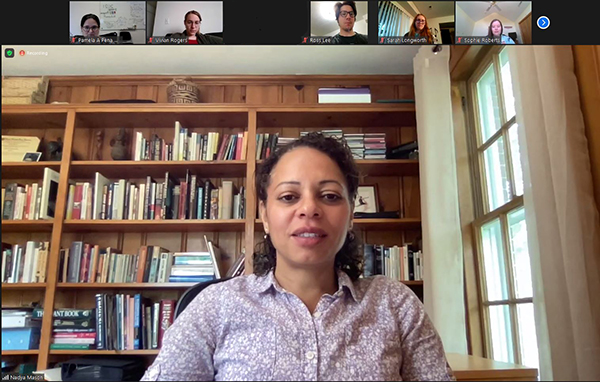
I-MRSEC PI Nadya Mason introduces REU undergrads to the Center during the Zoom REU Orientation.
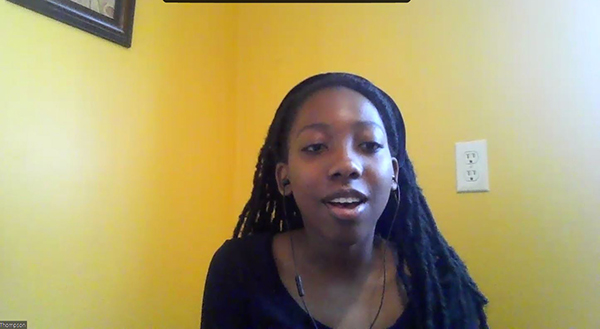
I-MRSEC REU undergrad Kamila Thompson asks a question during the REU's Zoom Orientation.
June 16, 2021
Ten undergraduate students who signed up for the
I-MRSEC (Illinois Materials Research Science and Engineering Center) virtual Research Experience for Undergraduates (REU) are spending the summer of 2021 discovering what research is like. In addition, they're being given the opportunity to build a network plus gain skills that they'll most likely find helpful down the road—whether they go into a career in science or not. Participants are also hopefully getting a better idea of what they want to do career-wise. Some may even be determining whether grad school might be in their future, or if research—specifically Materials Science research—might be the career for them.
Lasting for 10 weeks, from June 1–August 8, 2021, the REU has four main components. These are the research experience itself, faculty seminars, professional development, and an outreach project. The undergrads also will have the opportunity to present the results of their research at the summer's end.
The research experience itself involves conducting cutting-edge research in the lab of one of I-MRSEC's faculty, while being mentored by not only the faculty researcher, but his or her grad students as well. Plus, in addition to all that the undergrads will experience while doing the research itself, another perk is some of the technical training they'll receive. For example, to equip the undergrads with the skills they'll need to complete their research this summer, they're being trained in one or more of the following programming languages/operating systems, depending on their research project: Bash/Linux, Python, as well as GitHub, a website that hosts open-source software and fosters collaboration. These are tools that the students will also most likely find useful in the future.
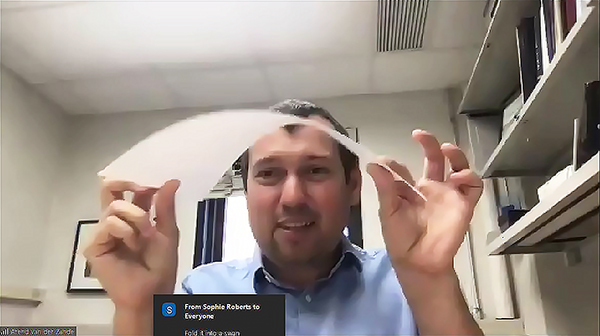
I-MRSEC faculty Arend van der Zande likens graphene to a piece of paper, which can be rolled, folded, cut, or stacked.
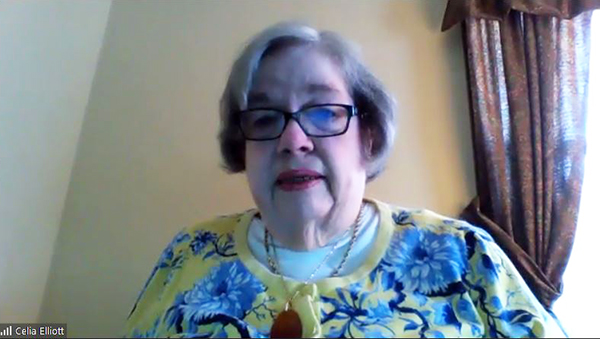
During Orientation, Physics' Celia Elliott teaches the undergrads how to conduct a literature search.
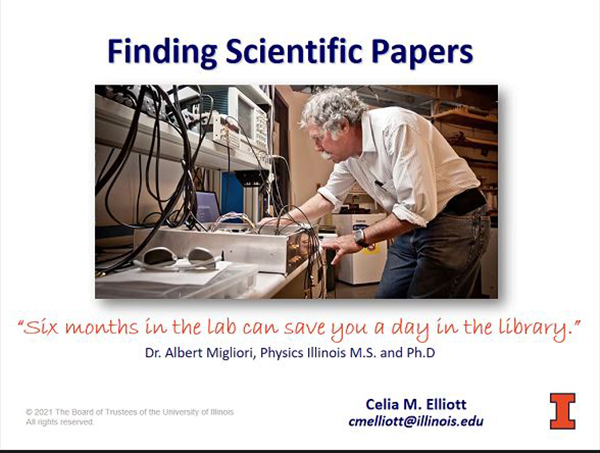 Elliott's slide citing Illinois Physicist Albert Migliori's tongue-in-cheek quote: "Six months in the lab can save you a day in the library."
Elliott's slide citing Illinois Physicist Albert Migliori's tongue-in-cheek quote: "Six months in the lab can save you a day in the library."
Another REU component is the faculty presentations, which will broaden the undergrads' exposure to research beyond the particular research they'll be conducting by introducing them to research outside their specific lab. Some of the eight faculty who are presenting include I-MRSEC PI Nadya Mason, Arend van der Zande who discussed nanotechnology on June 16th, and Andre Schleife, who will discuss his research on June 23rd. To foster relationship building and networking, the schedule also includes a virtual Ice Cream Social (no virtual ice cream, however) several virtual coffee hours, and a GatherTown event.
Another main component of the REU is the professional development (PD) sessions. Jointly organized between several campus programs, they were designed to equip the undergrads with skills they will most likely need in the future. For instance, some of the PD is addressing research and communication skills, such as a session on Research Ethics presented by researcher Cathy Murphy on June 28th. Plus, students are receiving training in skills they will need to complete some of the REU requirements this summer; so, students are learning how to do scientific writing and presentations, and how to do poster sessions. Other PD sessions will address skills they'll probably need no matter what career they choose; these include how to apply for a job or to grad school, how to write a CV or resume, combatting imposter syndrome, and about entrepreneurship.
The fourth program component, the outreach project, will be similar to what the program had last summer's students do. The students will form groups and create outreach videos aimed at middle school audiences.
This summer’s REU officially began on June 1st with a two-day orientation. The first morning, PI Nadya Mason introduced participants to I-MRSEC , then they learned about the program from I-MRSEC's Outreach Coordinator, Pamela Pena Martin. She touched on how academic research is conducted, then addressed the REU's four main components: the research experience, faculty seminars, professional development, and the outreach project.
As a closing exercise on the first day of orientation, Pena Martin asked participants to write out and possibly share what their short and long-term goals are. As part of the activity—part goal planning and part icebreaker— some of the undergrads shared a bit about themselves, including why they chose to participate in a summer research experience. For example, one student hoped to discover something new. Another participant, reported that he has a book of what he called “weird” engineering ideas, and hoped to prototype a couple—one in particular. Another undergrad hoped to discover what field she wants to go into—Materials Science, perhaps?
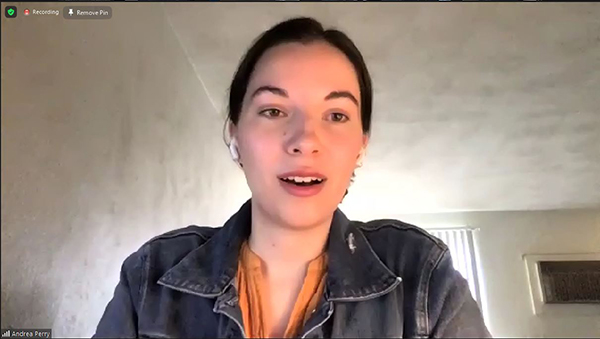
Andrea Perry, an I-MRSEC grad student, shares her how she got to where she is today during the “Making the Most of Your REU” student panel.
During the second day’s orientation, students learned how to conduct a literature search during a session taught by Celia Elliott, then experienced a panel: “Making the Most of Your REU,” which included a participant from last year’s I-MRSEC REU, Isiah Ramos, who is serving as mentor this year, as well as I-MRSEC grad student researchers Azel Murzabekova and Andrea Perry. In the afternoons on both days, the undergrads met with their mentors to learn more about their individual research activities.
On the following week, several of the REU’s other regularly scheduled activities began. For example, most Mondays and Thursdays from 12:00–1:00 pm, the undergrads are participating in the PD seminars. The faculty seminar series is being held every Wednesday from 12:00–1:00.
Another important component of the program is the chance to present their research in early August during a symposium held the final week of the program. Students will both give a final oral presentation, as well as submit a paper.

I-MRSEC REU undergrad Ashlie Hamilton. (Image courtesy of Ashlie Hamilton.)
The ten undergrads themselves, who come from across the U.S. and from a variety of science/engineering disciplines, are conducting multi-disciplinary research in several areas. For instance, conducting research in Pinshane Huang’s lab is Ashlie Hamilton, who is being mentored by Illinois grad student Edmund Han.
Ashlie Hamilton from Minneapolis, Minnesota is a rising junior this fall at the University of Minnesota - Twin Cities, majoring in Materials Science and Engineering and minoring in Astrophysics. Her research this summer involves performing Bloch wave simulations of electron diffraction to identify different stacking orders of 2D bilayers. She chose to participate in I-MRSEC’s REU program because she wanted to “explore the Materials Science research field as I'm currently planning on attending graduate school once I get my Bachelor's degree.”
Though it’s still early in the summer, Hamilton reports that she’s learned more in-depth information about certain topics (2D Materials, Electron Microscopy, Electron diffraction) and programs (Emaps, Command Prompt, Fiji, FINDSYM). “I've also been given the opportunity to attend different faculty seminars to learn about different experimental and computational research projects,” she adds.
Hamilton's mentor, grad student Edmund Han, says her independent research project conducting electron diffraction simulations of 2D materials will help his research by identifying stacking orders of 2D materials with electron microscopy. Indicating why he chose to be an REU mentor, Han claims, “Because I enjoy STEM research, and I would like to share and advocate for research to the next generations of scientists.” Regarding the benefits of having an undergrad in the lab, he says it “improves the productivity of our research project,” and that it’s “helpful to have a new and different perspective in our lab when presenting our research work.”
Han's goals for Ashlie over the summer include learning how to read scientific papers, conduct her own research experiments, plus present her work well to a general audience. “She is doing really well so far,” he acknowledges, “and I have great confidence that she will accomplish her research goals this summer!”
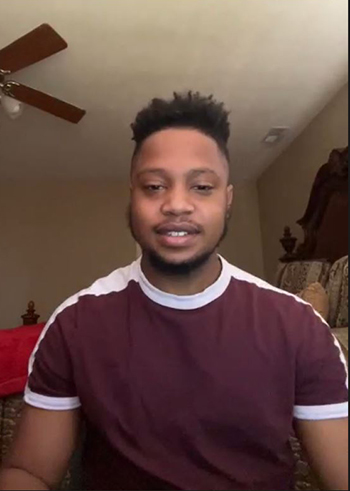
Isaiah Hunter.
Working in Andre Schleife’s lab and being mentored by two of his graduate students, Kisung Kang and Junehu Park, is Isaiah Hunter.
Isaiah Hunter from Indianapolis, Indiana is a rising senior majoring in Chemistry at Texas Southern University. His research in the REU is with Metallic Antiferromagnetic Materials. “I will help determine the fundamental limits on the control of magnetic order and magnetization dynamics,” he explains. “I will be using the computer language of Python to build a database that will make Magnetic Point Groups and their tables easily accessible.” Hunter says he participated in this REU to further his skills in research and analyzing data in hopes of one day obtaining a PhD. So far, he’s learned how to use Python, as well as how to store data in an efficient way.
Regarding his undergrad, Schleife says Isaiah is helping them better identify materials that show interesting magneto-optical properties by using information on group theory on a web site. He reports, “We would like to search this information ‘backwards,’ i.e., in the other direction than the web site currently provides it, and Isaiah is helping us accomplish that.”
Schleife explains why he and his researchers got involved in mentoring in the REU. “Working with undergraduate researchers is always rewarding, and the MRSEC has a history of attracting excellent candidates! I am glad that this year I can be part of it.” He goes on to share the benefits of having an undergrad in his lab, indicating that Hunter can help his grad students, “explore side projects that they may not have time for. It's a great way to dig deeper into an interesting question and also to try out something we're not sure whether it will work.”
Schleife hopes that by summer’s end, Hunter “will have gotten a good experience and learned what research is like, both from working on our project, talking to fellow REU students, and from various presentations that the MRSEC is setting up along these lines. It would be great if Isaiah likes his research experience and considers research an option for his future career!”
Ross Lee is conducting research in the lab of I-MRSEC PI, Nadya Mason and is also being mentored by Narendra Jaggi, a professor at Illinois Wesleyan. The rising senior majoring in Chemical Engineering at Brigham Young University was interested in a material science REU since his school doesn’t have a material science program. Then, a condensed matter physicist at his school recommended Illinois. Now he’s doing a quantum computing project in Mason’s lab. “Our goal is to optimize the sequence of codons in a protein with the computer,” he explains. (A quantum computer computes and stores info based on quantum principles rather than classical ones.)
Lee says his research has huge applications for the areas he’s interested in: chemical, materials, and nuclear engineering. Not sure what field he wants to go into career wise, he says: “I have a lot of interests, but especially in nuclear, so material science is definitely something that I’ve thought about pretty seriously.”
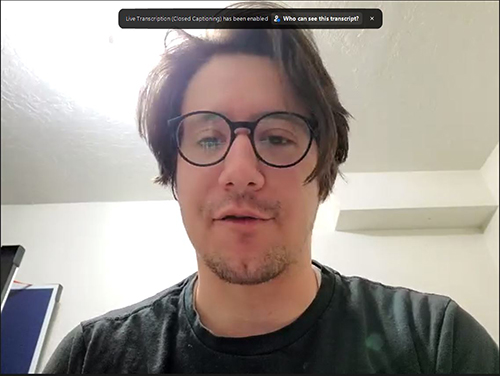
Ross Lee, a rising senior at Brigham Young University.
Lee has gained skills in several areas this summer, including collaboration and communication. “I think the way that I’m collaborating with Nadya and my cohort Dr Jaggi—I think it’s really given me a good perspective on how to stay organized and communicate well, even if we’re in remote settings—which I think is excellent.” In addition, he’s learned a lot about quantum computing and the methods used for that, as well as how to use specific Python libraries with quantum computers.
Lee feels the networking and relationships built through the REU have been beneficial; “I feel like I’ve been able to definitely build a relationship with Dr Jaggi for sure, because we meet just about every other day.” He also meets with Nadya Mason every Friday. “I feel even with Zoom, it’s still a good platform to ask questions on and get a better sense of people’s research,” he adds, regarding the REU’s online platform. “I feel like I’ve been able to network pretty well so far,” he acknowledges, but admits, “I wonder about where I’d be at socially if it was in person.”
Since Lee hasn’t decided for sure what field, he wants to go into, his dream job is still up in the air. However, he works for a startup involved with biofilm synthesis, working on a prototype right now which is about 90% done, and admits, “I’d say if that takes off; that’s definitely a dream of mine.” He’d also love to design materials for nuclear reactors.
During orientation, Lee mentioned that he had a list of “weird” engineering ideas he hoped to implement someday. “So, I call it my idea journal,” he explains. “I started it when I was 14, and so I have several ideas in there.” One idea he actually got while sitting on a bench in the Netherlands watching people ride their bikes. “Because it’s very bike friendly,” he recalls, “and there’s lots of cobblestone and stuff.” What resulted were some novel ideas for e-bikes, probably his favorite thing on his to-do list. Lee is also really into hobbyist-level open source electronics like Arduino and Raspberry Pi, and designed a full garden irrigation system last year with an Arduino Mega.
So, when did Lee become interested in science and engineering? When he was really, really young. “I’ve been pulling stuff apart since I was five years old,” he admits.
Another undergrad, Sarah Longworth, is being mentored by Illinois grad student Meba Gebre while conducting research in Daniel Shoemaker’s lab. From Nixa, Missouri, Longworth is a rising senior at Missouri State University, where she is majoring in chemistry, with a minor in physics. Her research this summer involves calculating the stability energies of potential topological insulators.
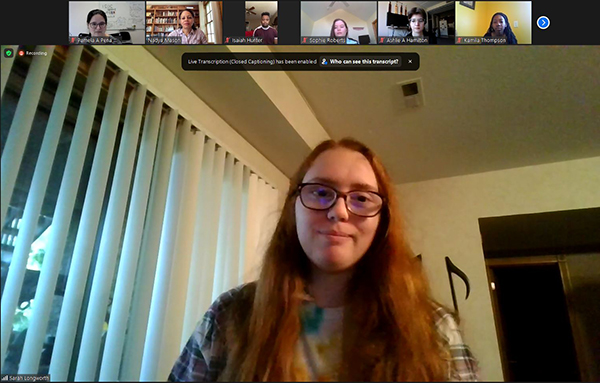
I-MRSEC REU undergrad Sarah Longworth participating during the REU Orientation via Zoom.
“By comparing the calculated energies, she explains, “we can guess which compounds are more likely to form in the lab and be more efficient in growing novel materials.”
Longworth indicates that she decided to participate in I-MRSEC’s REU because it's such a different environment than anything she’s encountered on her home campus. “Getting to work with the MRSEC and see all these people from different fields coming together to work on a common goal is a very exciting experience for me,” she acknowledges. “My own school has some materials science and interdisciplinary research, but nothing on this scale, so I am hoping to learn more about both of these this summer.”
Longworth says that so far, she’s learned a lot about coding and programming. “I've never programmed before this summer,” she admits, “so using python and doing a computational project is all new to me.”
Story by Elizabeth Innes, Communications Specialist, I-STEM Education Insitiative. Photos by Elizabeth Innes, unless otherwise noted.
For additional articles about the I-MRSEC REU, please see:
- I-MRSEC’s Virtual REU Undergrads Gain Knowledge, Skills, and Insights into Their Future Careers
- I-MRSEC’s Virtual REU to Expose Undergrads to Research, Provide Training in Needed Skills
- I-MRSEC REU Exposes Undergrads to Materials Science, Research, and What Grad School Is Like
- I-MRSEC REU Teaches Carmen Paquette a Lot About Magnetism, Research, and Herself
More: Externally Funded, I-MRSEC, MatSE, Physics, I-MRSEC REU, Science Centers, 2021
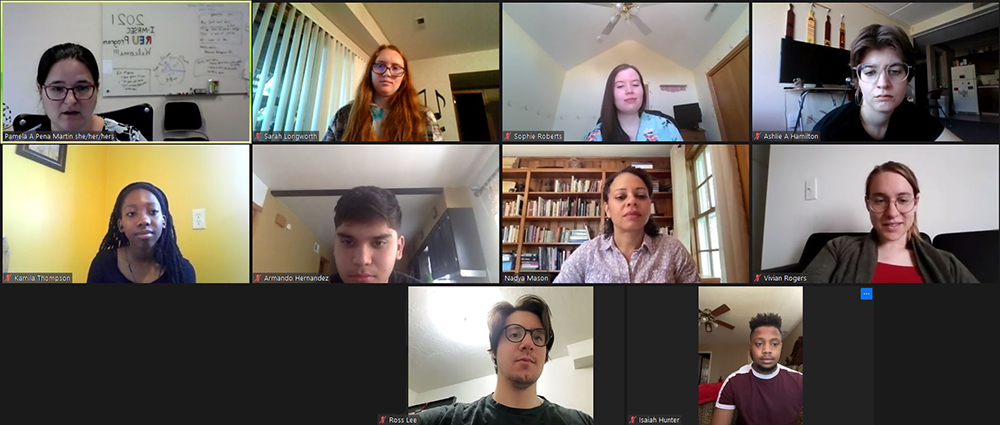
I-MRSEC PI Nadya Mason, 2nd row, third from the left), Outreach and Diversity Coordinator, Pamela Pena Martin (top row on the left), and most of the 2021 I-MRSEC REU undergrads during the June 1st orientation Zoom.













.jpg)
















